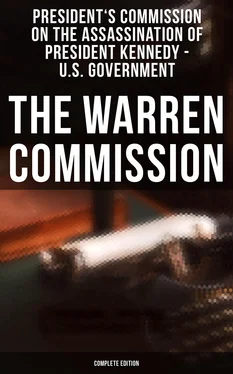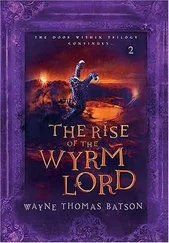Mrs. Oswald. That is in Moldavia, where we lived. That is after the war. It was a very good life there. They still had some kulaks, a lot of food, and we lived very well.
After the war, people lived there pretty well, but they were dekulakized subsequently.
By the way, I don't understand all of that, because these people worked with their own hands all their lives. I was very sorry when I heard that everything had been taken away from them and they had been sent somewhere to Siberia where after living in the south it would be very cold.
Mr. Rankin. Did your mother have any occupation?
Mrs. Oswald. Yes, laboratory assistant—I said that.
Mr. Rankin. Was she a member of the Communist Party?
Mrs. Oswald. No.
Mr. Rankin. Do you recall when your mother died?
Mrs. Oswald. In 1957.
Mr. Rankin. Did you receive a pension after your mother's death?
Mrs. Oswald. Yes.
Mr. Rankin. How much was it?
Mrs. Oswald. All children received pensions.
We received for it 3520 rubles, the old rubles.
Mr. Rankin. Was that called a children's pension?
Mrs. Oswald. Yes. It was paid up to majority, up to the age of 18.
Mr. Rankin. And was it paid to you directly or to your stepfather?
Mrs. Oswald. It was paid to me directly.
Mr. Rankin. Did your brother and sister get a similar pension?
Mrs. Oswald. Yes.
Mr. Rankin. Did your stepfather adopt you?
Mrs. Oswald. No, I was not adopted.
Mr. Rankin. What was your relationship with your half brother? Did you get along with him?
Mrs. Oswald. I loved them very much, and they loved me.
Mr. Rankin. And your half sister, too?
Mrs. Oswald. Yes. They are very good children. Not like me.
Mr. Rankin. Will you tell us what schools you went to?
Mrs. Oswald. At first I went to school in Moldavia, and later in Leningrad, in a girl's school and then after finishing school I studied in a pharmaceutical institute—pharmaceutical school, rather than institute.
Mr. Rankin. Where was the pharmaceutical school?
Mrs. Oswald. In Leningrad.
Mr. Rankin. Did you go through high school before you went to the pharmaceutical school?
Mrs. Oswald. Yes.
Mr. Rankin. Do you recall the names of any of your teachers?
Mrs. Oswald. Dmitry Rossovsky. I remember the director of the school, Nadelman Matvey Akimovich. It is hard to remember now. I have already forgotten. I have had good teachers. They treated me very well, they helped me after my mother died. Knowing my difficult nature, they approached me very pedagogically. But now I would have changed that nature.
Mr. Rankin. Were you a good student?
Mrs. Oswald. I was capable but lazy. I never spent much time studying. You know, everything came to me very easily. Sometimes my ability saved me. My language, you know—I talk a lot, and get a good grade.
Mr. Rankin. Did you work part-time while you were going to school?
Mrs. Oswald. Yes. The money which I received on the pension was not enough, and therefore I had to work as well as study.
Mr. Rankin. And what did you do in working?
Mrs. Oswald. At first I worked in a school cafeteria, school lunchroom. This was good for me, because I also got enough to eat that way.
And then I felt the work was not for me, that it was too restricted, and then I worked in a pharmacy. Then when I graduated I worked in a pharmacy as a full-fledged pharmacist—as a pharmacist's assistant.
Mr. Rankin. Before you graduated, how much were you paid for your work?
Mrs. Oswald. I think I received 36 per month—this is new rubles—at that time it was still 360 old rubles. But I could eat there three times a day. And then this was a lunchroom that was part of a large restaurant where everyone liked me and I always was treated to all sorts of tidbits and candy. I remember they had some busboys there who always saved something for me.
Mr. Rankin. Did you save any money while you were working before you graduated?
Mrs. Oswald. I don't know how to save money. I like to make presents.
Mr. Rankin. Where did you work after you graduated?
Mrs. Oswald. I was assigned to work in Leningrad, but my stepfather didn't want me to remain with him because he thought perhaps he would marry again, and, therefore, I left.
But he hasn't married up until now.
Mr. Rankin. I hand you Exhibit 20, and ask you if you know what that is.
Mrs. Oswald. This is my diploma. My goodness, what did they do with my diploma?
I can't work with it. The government seal is missing. Who will give me a new diploma?
Mr. Rankin. Mrs. Oswald, I want to explain to you—the Commission hasn't done anything to your diploma. We are informed that——
Mrs. Oswald. They should have treated it a little more carefully, though.
Mr. Rankin. The process was trying to determine fingerprints. It wasn't our action.
Mrs. Oswald. There must be many fingerprints on there. All of my teachers and everybody that ever looked at it. I am sorry—it is a pity for my diploma.
Mr. Rankin. We offer in evidence Exhibit 20.
The Chairman. It may be marked.
(The document referred to was marked Commission Exhibit No. 20, and received in evidence.)
Mr. Rankin. Do you know why on Exhibit 20 there is no date of admission to the school?
Mrs. Oswald. There is no entrance date on it, but it does show the date of issue and the date of graduation.
Mr. Rankin. Isn't there a place for admission, though?
Mrs. Oswald. Yes, there is a place for it.
Mr. Rankin. Do you know when you were admitted to the school?
Mrs. Oswald. In 1955.
Mr. Krimer. I might mention the place here is for the year only, not for a full date.
Mr. Dulles. 1955, did you say?
Mrs. Oswald. Yes, 1955.
Mr. Rankin. In this job that you obtained after you left the school, what were your duties?
Mrs. Oswald. When I worked in the pharmacy?
Mr. Rankin. Yes.
Mrs. Oswald. I worked in a hospital pharmacy. I prepared prescriptions. After the rounds every day, the doctors prescribed prescriptions, and the nurses of each department of the hospital enter that in a book, and turn it over to the pharmacy for preparation, where we again transcribed it from the nurses' book as a prescription and prepared it.
Mr. Rankin. Were you assigned to a particular job or did you go out and get the job? How was that arranged?
Mrs. Oswald. Generally upon graduation there is an assignment. I was sent to work to a drug warehouse in Leningrad. But this work was not very interesting, because everything was in packages. It is more of a warehousing job. And, therefore, if I had wanted to change I could have changed to any pharmacy. This assignment is only performed in order to guarantee that the graduate has a job. But the graduate can go to work somewhere else.
Mr. Rankin. How long did you stay in this first job?
Mrs. Oswald. I was there for three days, which is a probationary period, intended to have the employee familiarize himself with his duties. I didn't like that work, and I went to Minsk, and worked there. I worked there in my own specialty with pleasure. But the reference which I received after I was going to the United States was not very good, because they were very dissatisfied with the fact that I was going to the United States. They could not understand how could it be that a good worker could leave.
Mr. Rankin. Did you select Minsk as a place to go and work yourself?
Mrs. Oswald. Yes.
Mr. Rankin. You were not assigned there, then?
Mrs. Oswald. No.
Mr. Rankin. Could you have selected other places that you wished to go to and work?
Mrs. Oswald. Yes, but the registration is very difficult. In Russia you cannot settle in a large city if you are not registered.
Mr. Rankin. What do you mean by that?
Читать дальше












